Audit Independence & Financial Reporting in Australia
VerifiedAdded on 2020/05/28
|10
|2114
|73
AI Summary
This assignment examines the concept of audit independence within Australian organizations. It explores the importance of auditor objectivity in ensuring reliable financial reporting. A specific case study focuses on a Victorian manufacturing company's potential misrepresentation of their factory's fair value due to director bias and the implications for auditor opinion.
Contribute Materials
Your contribution can guide someone’s learning journey. Share your
documents today.
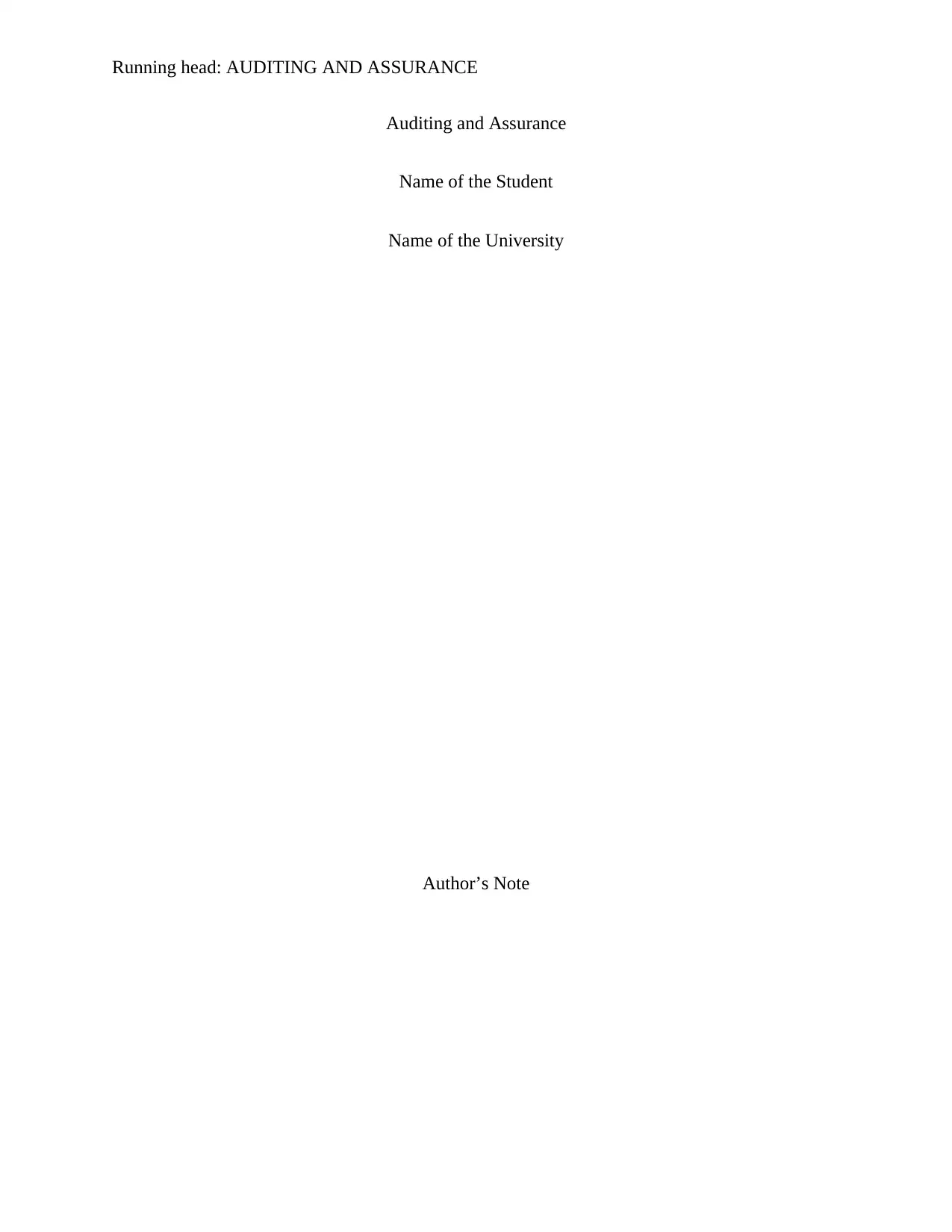
Running head: AUDITING AND ASSURANCE
Auditing and Assurance
Name of the Student
Name of the University
Author’s Note
Auditing and Assurance
Name of the Student
Name of the University
Author’s Note
Secure Best Marks with AI Grader
Need help grading? Try our AI Grader for instant feedback on your assignments.
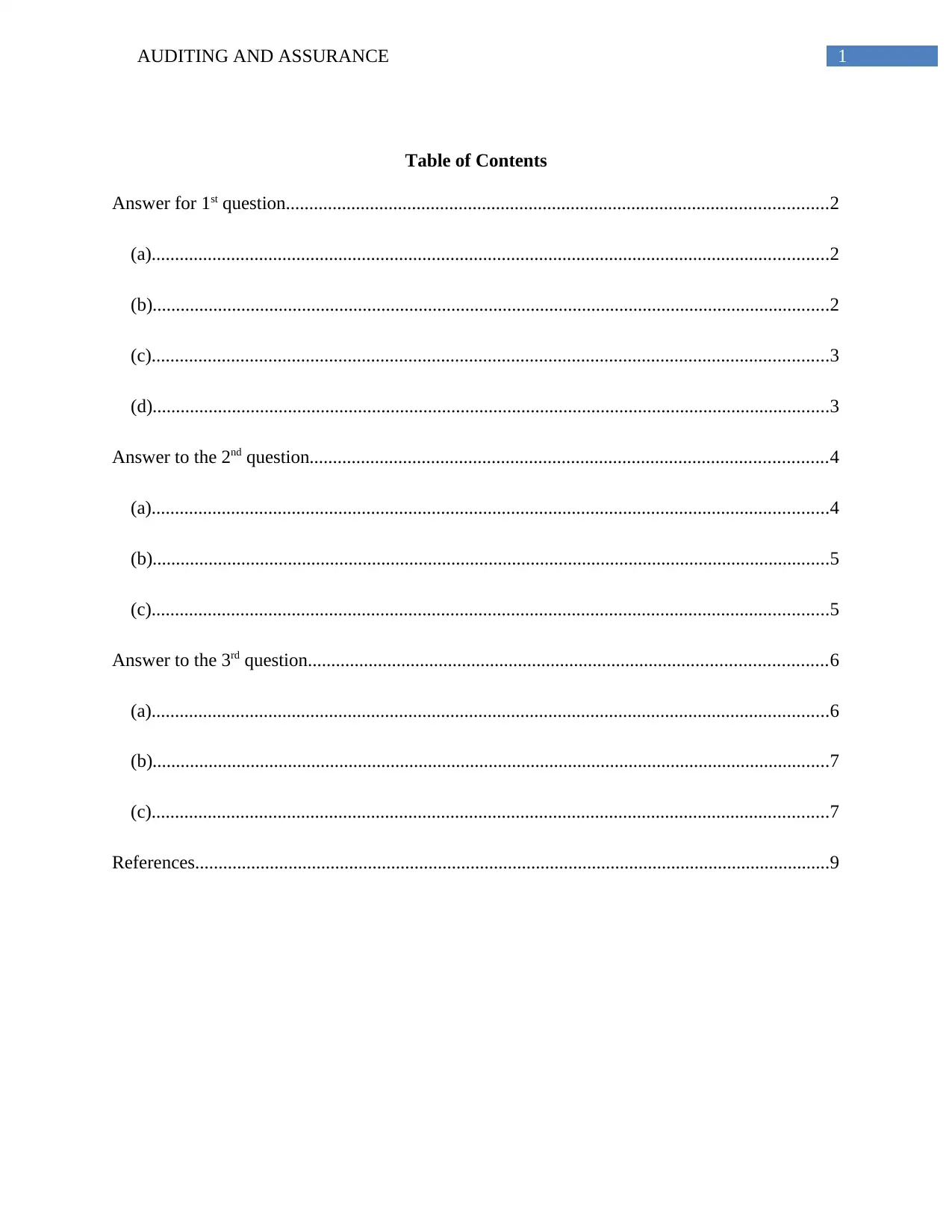
1AUDITING AND ASSURANCE
Table of Contents
Answer for 1st question....................................................................................................................2
(a).................................................................................................................................................2
(b).................................................................................................................................................2
(c).................................................................................................................................................3
(d).................................................................................................................................................3
Answer to the 2nd question...............................................................................................................4
(a).................................................................................................................................................4
(b).................................................................................................................................................5
(c).................................................................................................................................................5
Answer to the 3rd question...............................................................................................................6
(a).................................................................................................................................................6
(b).................................................................................................................................................7
(c).................................................................................................................................................7
References........................................................................................................................................9
Table of Contents
Answer for 1st question....................................................................................................................2
(a).................................................................................................................................................2
(b).................................................................................................................................................2
(c).................................................................................................................................................3
(d).................................................................................................................................................3
Answer to the 2nd question...............................................................................................................4
(a).................................................................................................................................................4
(b).................................................................................................................................................5
(c).................................................................................................................................................5
Answer to the 3rd question...............................................................................................................6
(a).................................................................................................................................................6
(b).................................................................................................................................................7
(c).................................................................................................................................................7
References........................................................................................................................................9
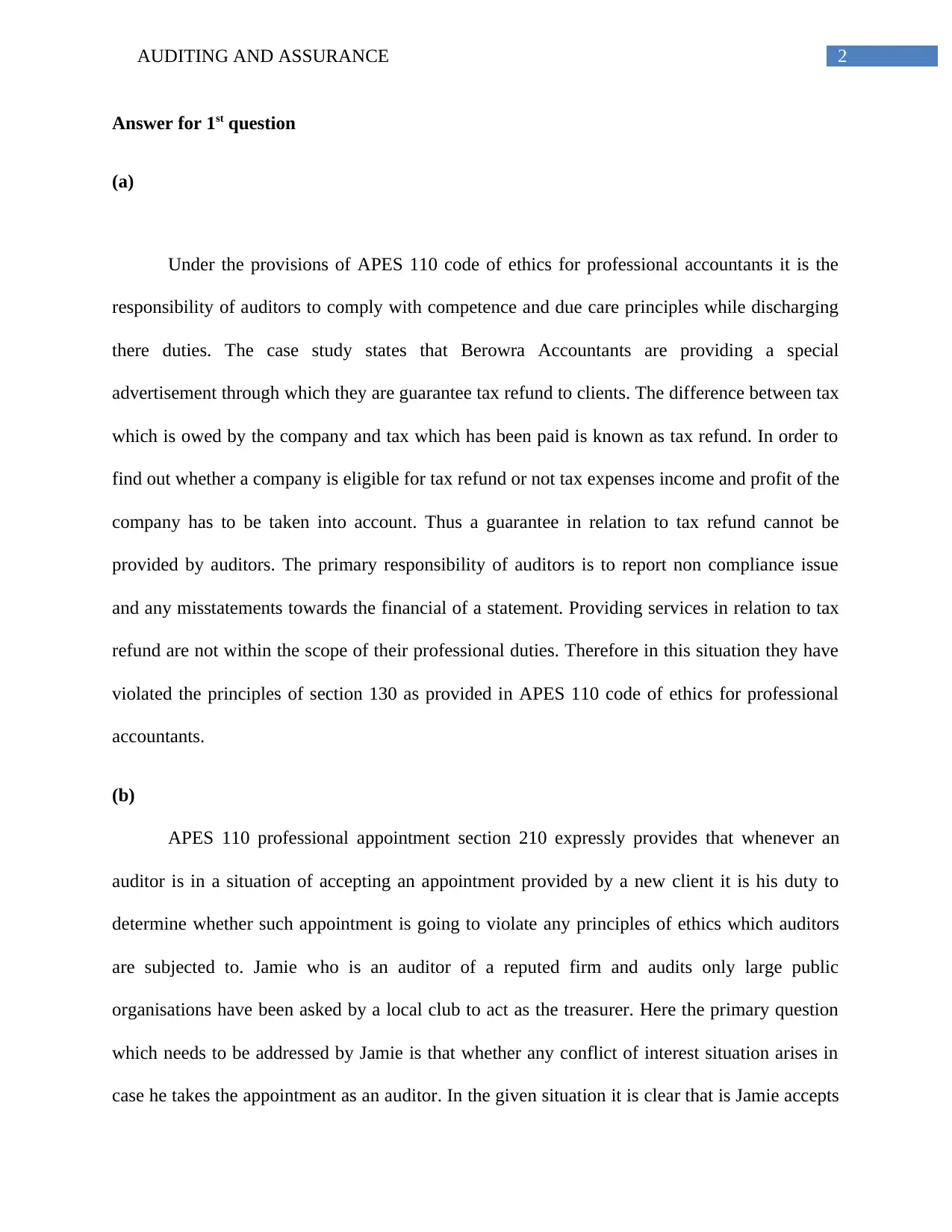
2AUDITING AND ASSURANCE
Answer for 1st question
(a)
Under the provisions of APES 110 code of ethics for professional accountants it is the
responsibility of auditors to comply with competence and due care principles while discharging
there duties. The case study states that Berowra Accountants are providing a special
advertisement through which they are guarantee tax refund to clients. The difference between tax
which is owed by the company and tax which has been paid is known as tax refund. In order to
find out whether a company is eligible for tax refund or not tax expenses income and profit of the
company has to be taken into account. Thus a guarantee in relation to tax refund cannot be
provided by auditors. The primary responsibility of auditors is to report non compliance issue
and any misstatements towards the financial of a statement. Providing services in relation to tax
refund are not within the scope of their professional duties. Therefore in this situation they have
violated the principles of section 130 as provided in APES 110 code of ethics for professional
accountants.
(b)
APES 110 professional appointment section 210 expressly provides that whenever an
auditor is in a situation of accepting an appointment provided by a new client it is his duty to
determine whether such appointment is going to violate any principles of ethics which auditors
are subjected to. Jamie who is an auditor of a reputed firm and audits only large public
organisations have been asked by a local club to act as the treasurer. Here the primary question
which needs to be addressed by Jamie is that whether any conflict of interest situation arises in
case he takes the appointment as an auditor. In the given situation it is clear that is Jamie accepts
Answer for 1st question
(a)
Under the provisions of APES 110 code of ethics for professional accountants it is the
responsibility of auditors to comply with competence and due care principles while discharging
there duties. The case study states that Berowra Accountants are providing a special
advertisement through which they are guarantee tax refund to clients. The difference between tax
which is owed by the company and tax which has been paid is known as tax refund. In order to
find out whether a company is eligible for tax refund or not tax expenses income and profit of the
company has to be taken into account. Thus a guarantee in relation to tax refund cannot be
provided by auditors. The primary responsibility of auditors is to report non compliance issue
and any misstatements towards the financial of a statement. Providing services in relation to tax
refund are not within the scope of their professional duties. Therefore in this situation they have
violated the principles of section 130 as provided in APES 110 code of ethics for professional
accountants.
(b)
APES 110 professional appointment section 210 expressly provides that whenever an
auditor is in a situation of accepting an appointment provided by a new client it is his duty to
determine whether such appointment is going to violate any principles of ethics which auditors
are subjected to. Jamie who is an auditor of a reputed firm and audits only large public
organisations have been asked by a local club to act as the treasurer. Here the primary question
which needs to be addressed by Jamie is that whether any conflict of interest situation arises in
case he takes the appointment as an auditor. In the given situation it is clear that is Jamie accepts
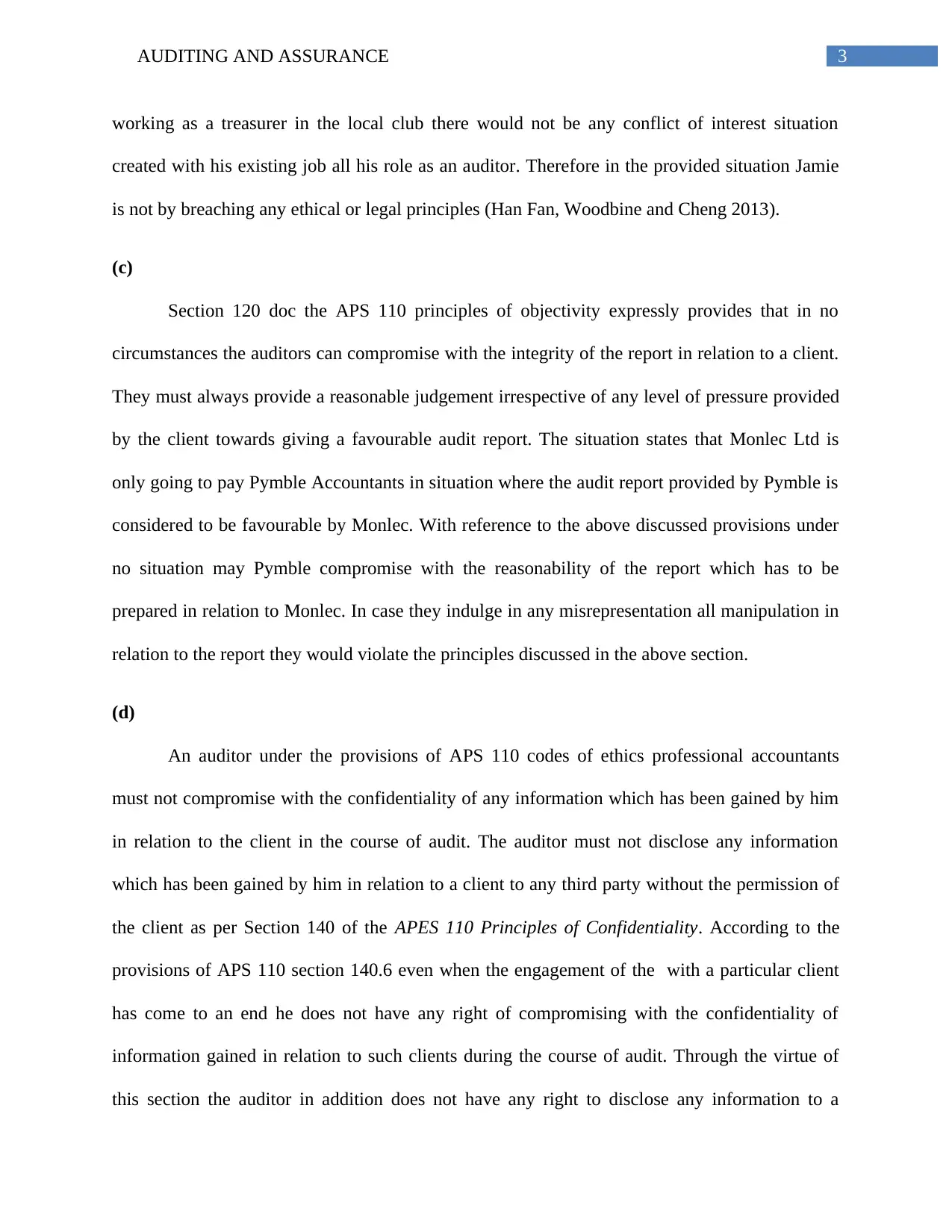
3AUDITING AND ASSURANCE
working as a treasurer in the local club there would not be any conflict of interest situation
created with his existing job all his role as an auditor. Therefore in the provided situation Jamie
is not by breaching any ethical or legal principles (Han Fan, Woodbine and Cheng 2013).
(c)
Section 120 doc the APS 110 principles of objectivity expressly provides that in no
circumstances the auditors can compromise with the integrity of the report in relation to a client.
They must always provide a reasonable judgement irrespective of any level of pressure provided
by the client towards giving a favourable audit report. The situation states that Monlec Ltd is
only going to pay Pymble Accountants in situation where the audit report provided by Pymble is
considered to be favourable by Monlec. With reference to the above discussed provisions under
no situation may Pymble compromise with the reasonability of the report which has to be
prepared in relation to Monlec. In case they indulge in any misrepresentation all manipulation in
relation to the report they would violate the principles discussed in the above section.
(d)
An auditor under the provisions of APS 110 codes of ethics professional accountants
must not compromise with the confidentiality of any information which has been gained by him
in relation to the client in the course of audit. The auditor must not disclose any information
which has been gained by him in relation to a client to any third party without the permission of
the client as per Section 140 of the APES 110 Principles of Confidentiality. According to the
provisions of APS 110 section 140.6 even when the engagement of the with a particular client
has come to an end he does not have any right of compromising with the confidentiality of
information gained in relation to such clients during the course of audit. Through the virtue of
this section the auditor in addition does not have any right to disclose any information to a
working as a treasurer in the local club there would not be any conflict of interest situation
created with his existing job all his role as an auditor. Therefore in the provided situation Jamie
is not by breaching any ethical or legal principles (Han Fan, Woodbine and Cheng 2013).
(c)
Section 120 doc the APS 110 principles of objectivity expressly provides that in no
circumstances the auditors can compromise with the integrity of the report in relation to a client.
They must always provide a reasonable judgement irrespective of any level of pressure provided
by the client towards giving a favourable audit report. The situation states that Monlec Ltd is
only going to pay Pymble Accountants in situation where the audit report provided by Pymble is
considered to be favourable by Monlec. With reference to the above discussed provisions under
no situation may Pymble compromise with the reasonability of the report which has to be
prepared in relation to Monlec. In case they indulge in any misrepresentation all manipulation in
relation to the report they would violate the principles discussed in the above section.
(d)
An auditor under the provisions of APS 110 codes of ethics professional accountants
must not compromise with the confidentiality of any information which has been gained by him
in relation to the client in the course of audit. The auditor must not disclose any information
which has been gained by him in relation to a client to any third party without the permission of
the client as per Section 140 of the APES 110 Principles of Confidentiality. According to the
provisions of APS 110 section 140.6 even when the engagement of the with a particular client
has come to an end he does not have any right of compromising with the confidentiality of
information gained in relation to such clients during the course of audit. Through the virtue of
this section the auditor in addition does not have any right to disclose any information to a
Secure Best Marks with AI Grader
Need help grading? Try our AI Grader for instant feedback on your assignments.
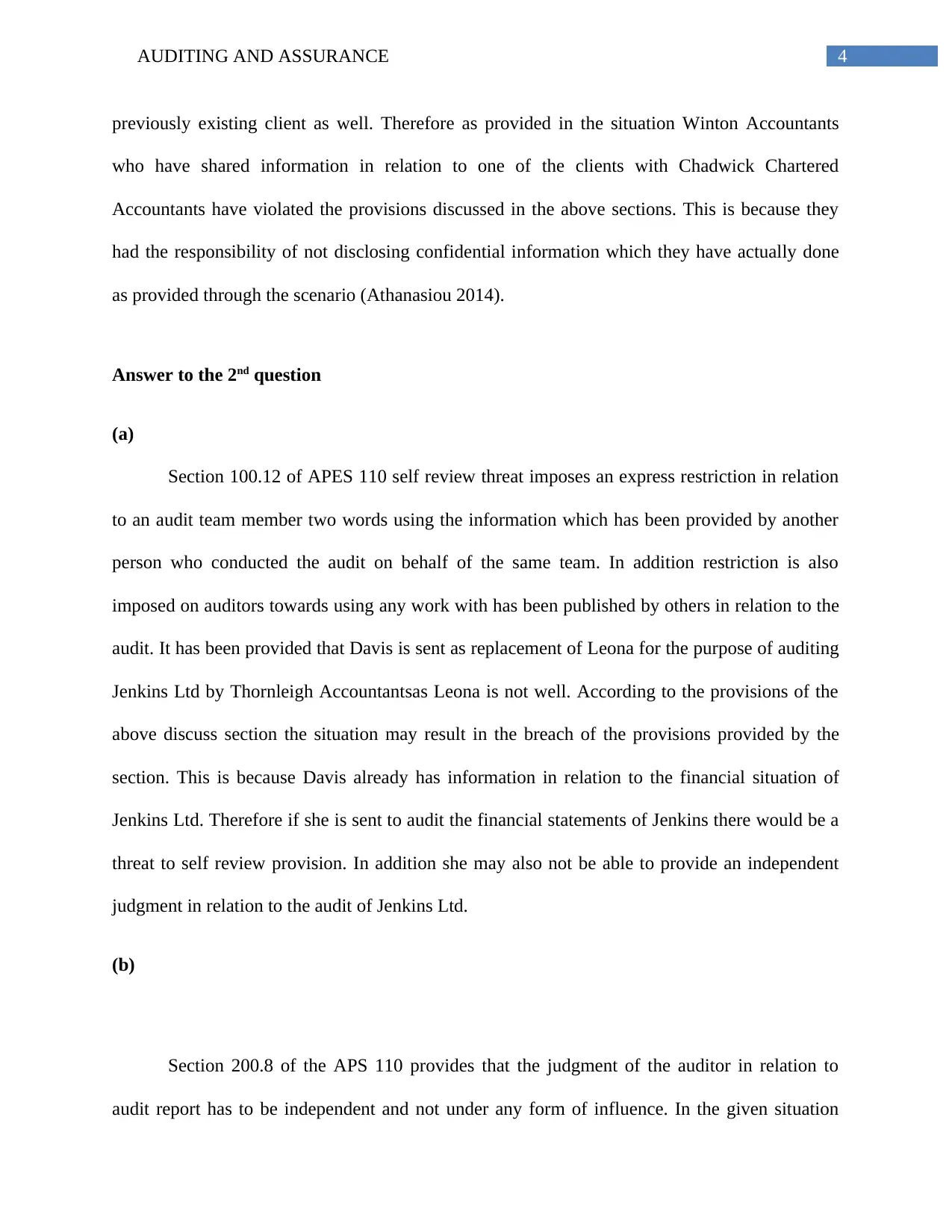
4AUDITING AND ASSURANCE
previously existing client as well. Therefore as provided in the situation Winton Accountants
who have shared information in relation to one of the clients with Chadwick Chartered
Accountants have violated the provisions discussed in the above sections. This is because they
had the responsibility of not disclosing confidential information which they have actually done
as provided through the scenario (Athanasiou 2014).
Answer to the 2nd question
(a)
Section 100.12 of APES 110 self review threat imposes an express restriction in relation
to an audit team member two words using the information which has been provided by another
person who conducted the audit on behalf of the same team. In addition restriction is also
imposed on auditors towards using any work with has been published by others in relation to the
audit. It has been provided that Davis is sent as replacement of Leona for the purpose of auditing
Jenkins Ltd by Thornleigh Accountantsas Leona is not well. According to the provisions of the
above discuss section the situation may result in the breach of the provisions provided by the
section. This is because Davis already has information in relation to the financial situation of
Jenkins Ltd. Therefore if she is sent to audit the financial statements of Jenkins there would be a
threat to self review provision. In addition she may also not be able to provide an independent
judgment in relation to the audit of Jenkins Ltd.
(b)
Section 200.8 of the APS 110 provides that the judgment of the auditor in relation to
audit report has to be independent and not under any form of influence. In the given situation
previously existing client as well. Therefore as provided in the situation Winton Accountants
who have shared information in relation to one of the clients with Chadwick Chartered
Accountants have violated the provisions discussed in the above sections. This is because they
had the responsibility of not disclosing confidential information which they have actually done
as provided through the scenario (Athanasiou 2014).
Answer to the 2nd question
(a)
Section 100.12 of APES 110 self review threat imposes an express restriction in relation
to an audit team member two words using the information which has been provided by another
person who conducted the audit on behalf of the same team. In addition restriction is also
imposed on auditors towards using any work with has been published by others in relation to the
audit. It has been provided that Davis is sent as replacement of Leona for the purpose of auditing
Jenkins Ltd by Thornleigh Accountantsas Leona is not well. According to the provisions of the
above discuss section the situation may result in the breach of the provisions provided by the
section. This is because Davis already has information in relation to the financial situation of
Jenkins Ltd. Therefore if she is sent to audit the financial statements of Jenkins there would be a
threat to self review provision. In addition she may also not be able to provide an independent
judgment in relation to the audit of Jenkins Ltd.
(b)
Section 200.8 of the APS 110 provides that the judgment of the auditor in relation to
audit report has to be independent and not under any form of influence. In the given situation
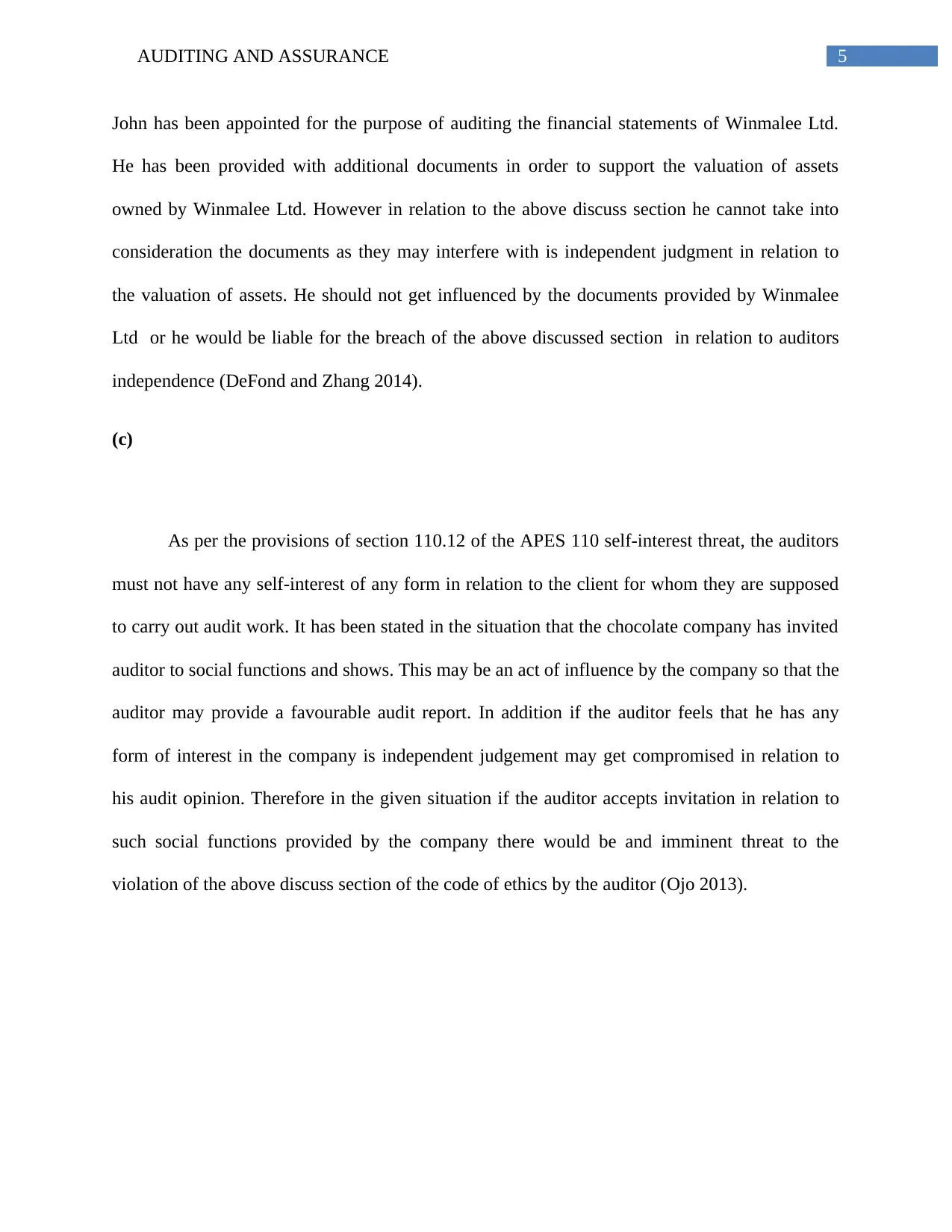
5AUDITING AND ASSURANCE
John has been appointed for the purpose of auditing the financial statements of Winmalee Ltd.
He has been provided with additional documents in order to support the valuation of assets
owned by Winmalee Ltd. However in relation to the above discuss section he cannot take into
consideration the documents as they may interfere with is independent judgment in relation to
the valuation of assets. He should not get influenced by the documents provided by Winmalee
Ltd or he would be liable for the breach of the above discussed section in relation to auditors
independence (DeFond and Zhang 2014).
(c)
As per the provisions of section 110.12 of the APES 110 self-interest threat, the auditors
must not have any self-interest of any form in relation to the client for whom they are supposed
to carry out audit work. It has been stated in the situation that the chocolate company has invited
auditor to social functions and shows. This may be an act of influence by the company so that the
auditor may provide a favourable audit report. In addition if the auditor feels that he has any
form of interest in the company is independent judgement may get compromised in relation to
his audit opinion. Therefore in the given situation if the auditor accepts invitation in relation to
such social functions provided by the company there would be and imminent threat to the
violation of the above discuss section of the code of ethics by the auditor (Ojo 2013).
John has been appointed for the purpose of auditing the financial statements of Winmalee Ltd.
He has been provided with additional documents in order to support the valuation of assets
owned by Winmalee Ltd. However in relation to the above discuss section he cannot take into
consideration the documents as they may interfere with is independent judgment in relation to
the valuation of assets. He should not get influenced by the documents provided by Winmalee
Ltd or he would be liable for the breach of the above discussed section in relation to auditors
independence (DeFond and Zhang 2014).
(c)
As per the provisions of section 110.12 of the APES 110 self-interest threat, the auditors
must not have any self-interest of any form in relation to the client for whom they are supposed
to carry out audit work. It has been stated in the situation that the chocolate company has invited
auditor to social functions and shows. This may be an act of influence by the company so that the
auditor may provide a favourable audit report. In addition if the auditor feels that he has any
form of interest in the company is independent judgement may get compromised in relation to
his audit opinion. Therefore in the given situation if the auditor accepts invitation in relation to
such social functions provided by the company there would be and imminent threat to the
violation of the above discuss section of the code of ethics by the auditor (Ojo 2013).
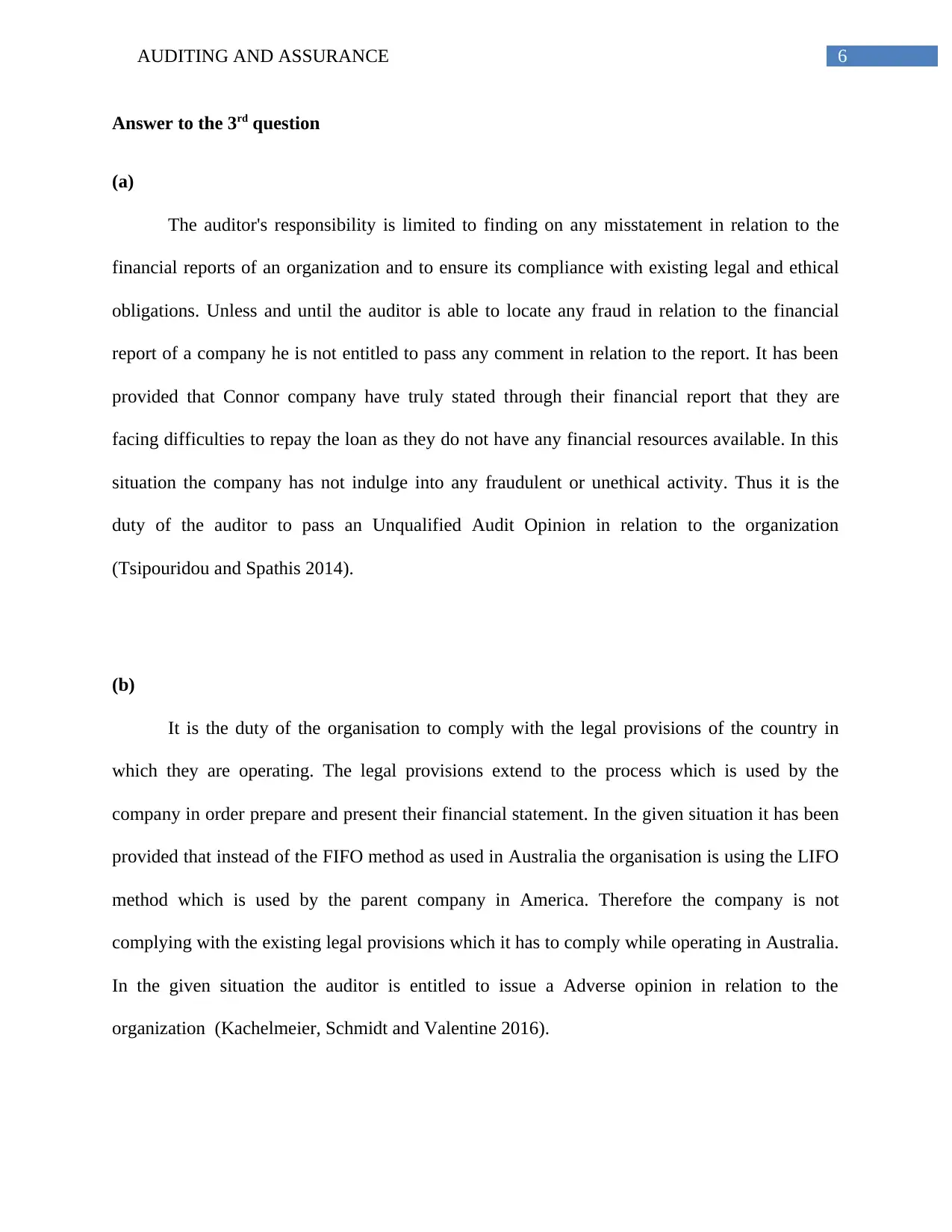
6AUDITING AND ASSURANCE
Answer to the 3rd question
(a)
The auditor's responsibility is limited to finding on any misstatement in relation to the
financial reports of an organization and to ensure its compliance with existing legal and ethical
obligations. Unless and until the auditor is able to locate any fraud in relation to the financial
report of a company he is not entitled to pass any comment in relation to the report. It has been
provided that Connor company have truly stated through their financial report that they are
facing difficulties to repay the loan as they do not have any financial resources available. In this
situation the company has not indulge into any fraudulent or unethical activity. Thus it is the
duty of the auditor to pass an Unqualified Audit Opinion in relation to the organization
(Tsipouridou and Spathis 2014).
(b)
It is the duty of the organisation to comply with the legal provisions of the country in
which they are operating. The legal provisions extend to the process which is used by the
company in order prepare and present their financial statement. In the given situation it has been
provided that instead of the FIFO method as used in Australia the organisation is using the LIFO
method which is used by the parent company in America. Therefore the company is not
complying with the existing legal provisions which it has to comply while operating in Australia.
In the given situation the auditor is entitled to issue a Adverse opinion in relation to the
organization (Kachelmeier, Schmidt and Valentine 2016).
Answer to the 3rd question
(a)
The auditor's responsibility is limited to finding on any misstatement in relation to the
financial reports of an organization and to ensure its compliance with existing legal and ethical
obligations. Unless and until the auditor is able to locate any fraud in relation to the financial
report of a company he is not entitled to pass any comment in relation to the report. It has been
provided that Connor company have truly stated through their financial report that they are
facing difficulties to repay the loan as they do not have any financial resources available. In this
situation the company has not indulge into any fraudulent or unethical activity. Thus it is the
duty of the auditor to pass an Unqualified Audit Opinion in relation to the organization
(Tsipouridou and Spathis 2014).
(b)
It is the duty of the organisation to comply with the legal provisions of the country in
which they are operating. The legal provisions extend to the process which is used by the
company in order prepare and present their financial statement. In the given situation it has been
provided that instead of the FIFO method as used in Australia the organisation is using the LIFO
method which is used by the parent company in America. Therefore the company is not
complying with the existing legal provisions which it has to comply while operating in Australia.
In the given situation the auditor is entitled to issue a Adverse opinion in relation to the
organization (Kachelmeier, Schmidt and Valentine 2016).
Paraphrase This Document
Need a fresh take? Get an instant paraphrase of this document with our AI Paraphraser
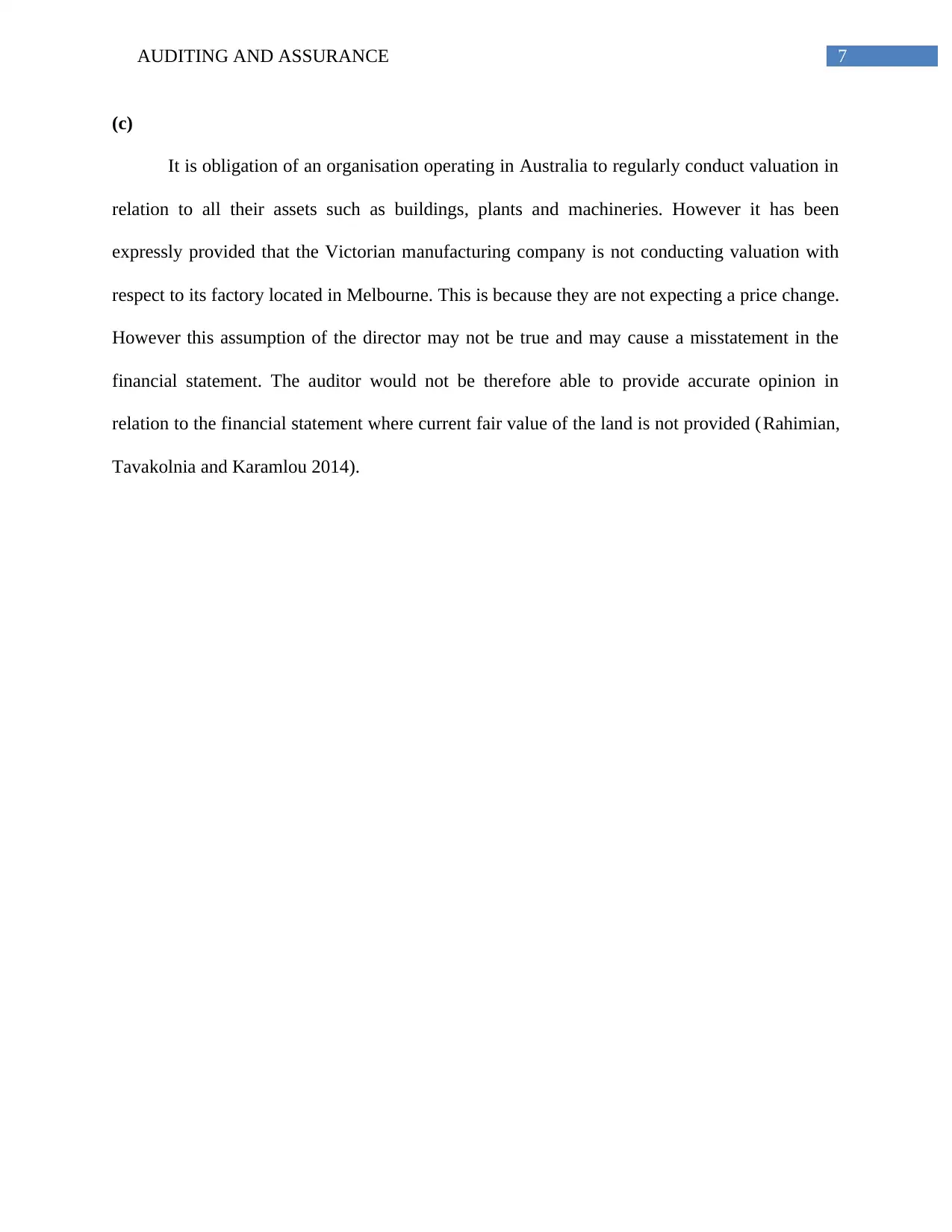
7AUDITING AND ASSURANCE
(c)
It is obligation of an organisation operating in Australia to regularly conduct valuation in
relation to all their assets such as buildings, plants and machineries. However it has been
expressly provided that the Victorian manufacturing company is not conducting valuation with
respect to its factory located in Melbourne. This is because they are not expecting a price change.
However this assumption of the director may not be true and may cause a misstatement in the
financial statement. The auditor would not be therefore able to provide accurate opinion in
relation to the financial statement where current fair value of the land is not provided (Rahimian,
Tavakolnia and Karamlou 2014).
(c)
It is obligation of an organisation operating in Australia to regularly conduct valuation in
relation to all their assets such as buildings, plants and machineries. However it has been
expressly provided that the Victorian manufacturing company is not conducting valuation with
respect to its factory located in Melbourne. This is because they are not expecting a price change.
However this assumption of the director may not be true and may cause a misstatement in the
financial statement. The auditor would not be therefore able to provide accurate opinion in
relation to the financial statement where current fair value of the land is not provided (Rahimian,
Tavakolnia and Karamlou 2014).
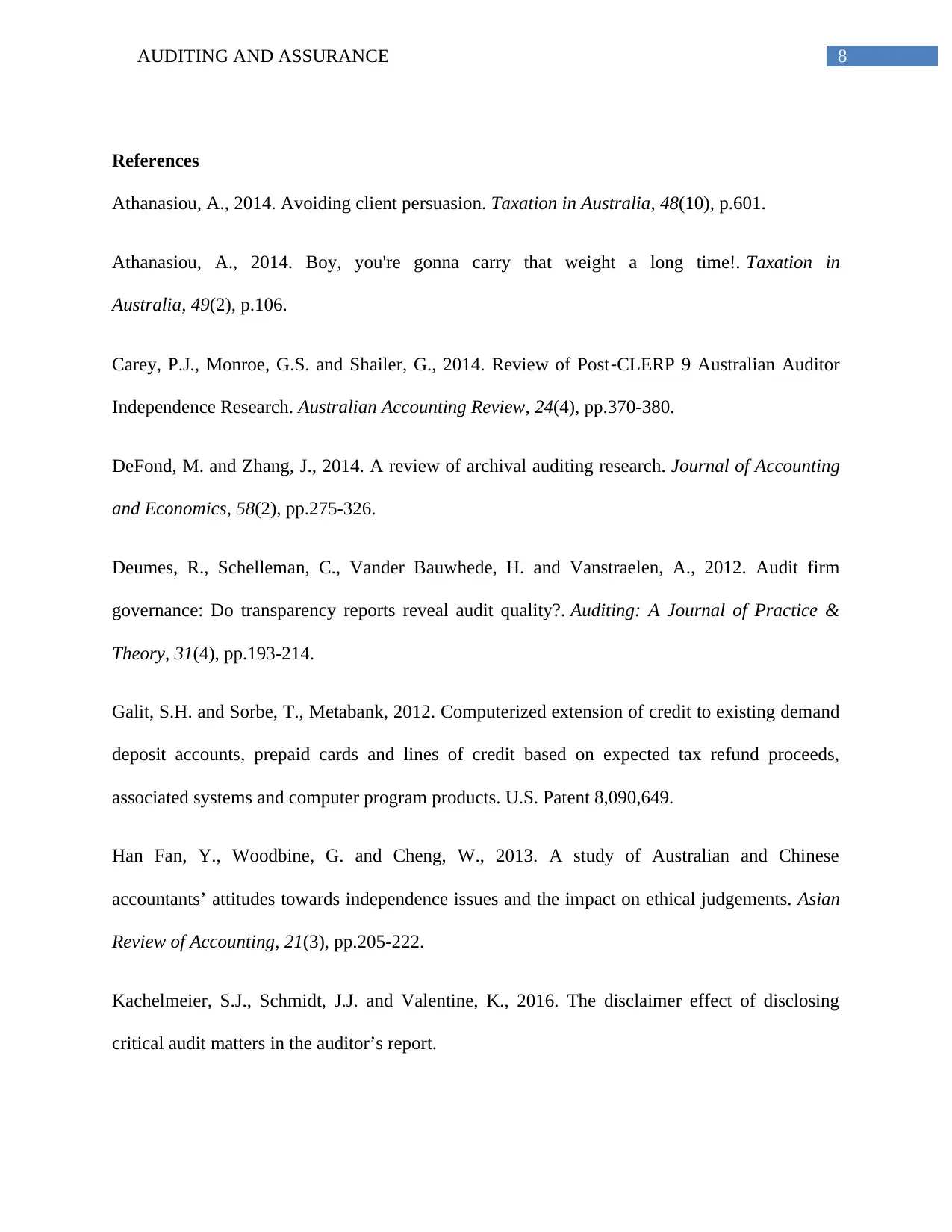
8AUDITING AND ASSURANCE
References
Athanasiou, A., 2014. Avoiding client persuasion. Taxation in Australia, 48(10), p.601.
Athanasiou, A., 2014. Boy, you're gonna carry that weight a long time!. Taxation in
Australia, 49(2), p.106.
Carey, P.J., Monroe, G.S. and Shailer, G., 2014. Review of Post‐CLERP 9 Australian Auditor
Independence Research. Australian Accounting Review, 24(4), pp.370-380.
DeFond, M. and Zhang, J., 2014. A review of archival auditing research. Journal of Accounting
and Economics, 58(2), pp.275-326.
Deumes, R., Schelleman, C., Vander Bauwhede, H. and Vanstraelen, A., 2012. Audit firm
governance: Do transparency reports reveal audit quality?. Auditing: A Journal of Practice &
Theory, 31(4), pp.193-214.
Galit, S.H. and Sorbe, T., Metabank, 2012. Computerized extension of credit to existing demand
deposit accounts, prepaid cards and lines of credit based on expected tax refund proceeds,
associated systems and computer program products. U.S. Patent 8,090,649.
Han Fan, Y., Woodbine, G. and Cheng, W., 2013. A study of Australian and Chinese
accountants’ attitudes towards independence issues and the impact on ethical judgements. Asian
Review of Accounting, 21(3), pp.205-222.
Kachelmeier, S.J., Schmidt, J.J. and Valentine, K., 2016. The disclaimer effect of disclosing
critical audit matters in the auditor’s report.
References
Athanasiou, A., 2014. Avoiding client persuasion. Taxation in Australia, 48(10), p.601.
Athanasiou, A., 2014. Boy, you're gonna carry that weight a long time!. Taxation in
Australia, 49(2), p.106.
Carey, P.J., Monroe, G.S. and Shailer, G., 2014. Review of Post‐CLERP 9 Australian Auditor
Independence Research. Australian Accounting Review, 24(4), pp.370-380.
DeFond, M. and Zhang, J., 2014. A review of archival auditing research. Journal of Accounting
and Economics, 58(2), pp.275-326.
Deumes, R., Schelleman, C., Vander Bauwhede, H. and Vanstraelen, A., 2012. Audit firm
governance: Do transparency reports reveal audit quality?. Auditing: A Journal of Practice &
Theory, 31(4), pp.193-214.
Galit, S.H. and Sorbe, T., Metabank, 2012. Computerized extension of credit to existing demand
deposit accounts, prepaid cards and lines of credit based on expected tax refund proceeds,
associated systems and computer program products. U.S. Patent 8,090,649.
Han Fan, Y., Woodbine, G. and Cheng, W., 2013. A study of Australian and Chinese
accountants’ attitudes towards independence issues and the impact on ethical judgements. Asian
Review of Accounting, 21(3), pp.205-222.
Kachelmeier, S.J., Schmidt, J.J. and Valentine, K., 2016. The disclaimer effect of disclosing
critical audit matters in the auditor’s report.
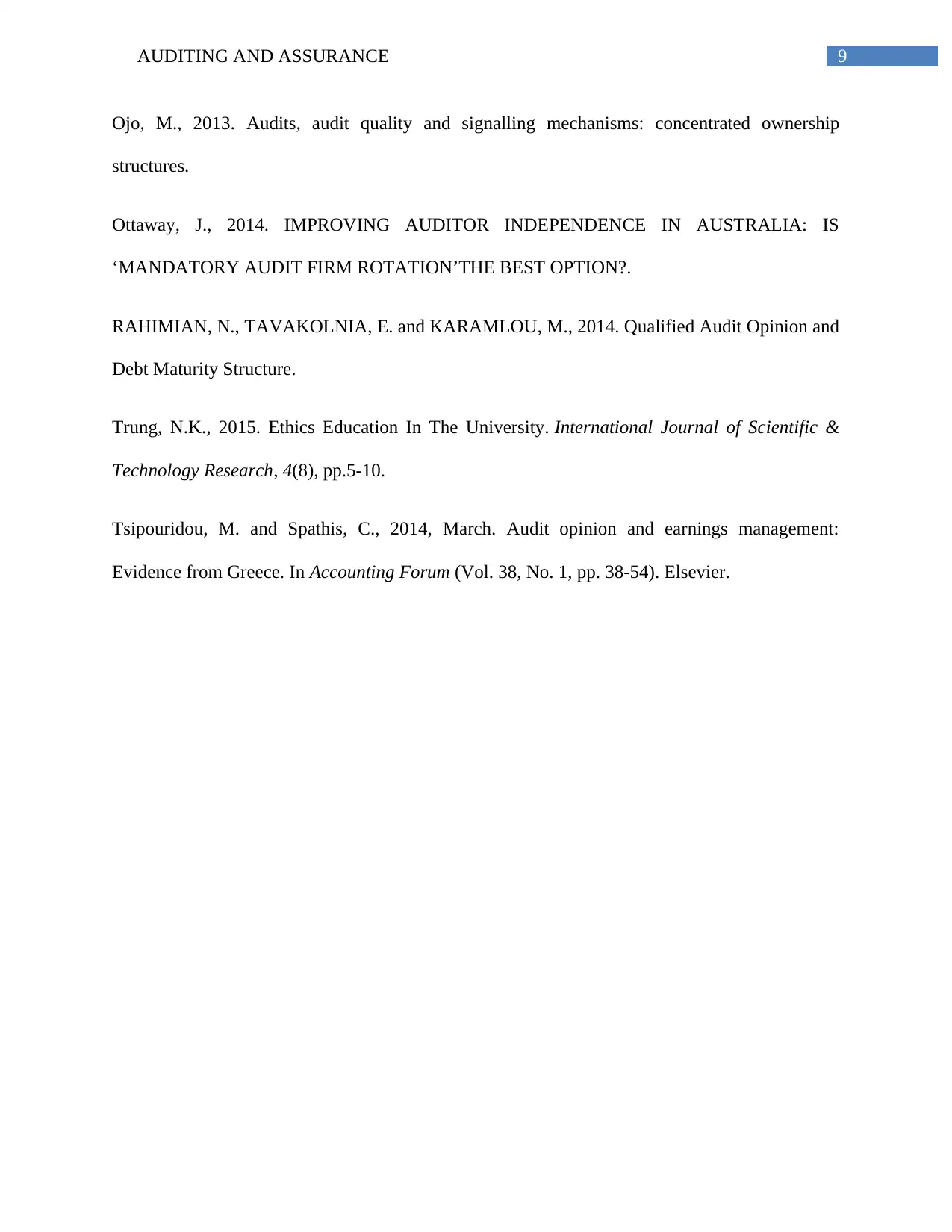
9AUDITING AND ASSURANCE
Ojo, M., 2013. Audits, audit quality and signalling mechanisms: concentrated ownership
structures.
Ottaway, J., 2014. IMPROVING AUDITOR INDEPENDENCE IN AUSTRALIA: IS
‘MANDATORY AUDIT FIRM ROTATION’THE BEST OPTION?.
RAHIMIAN, N., TAVAKOLNIA, E. and KARAMLOU, M., 2014. Qualified Audit Opinion and
Debt Maturity Structure.
Trung, N.K., 2015. Ethics Education In The University. International Journal of Scientific &
Technology Research, 4(8), pp.5-10.
Tsipouridou, M. and Spathis, C., 2014, March. Audit opinion and earnings management:
Evidence from Greece. In Accounting Forum (Vol. 38, No. 1, pp. 38-54). Elsevier.
Ojo, M., 2013. Audits, audit quality and signalling mechanisms: concentrated ownership
structures.
Ottaway, J., 2014. IMPROVING AUDITOR INDEPENDENCE IN AUSTRALIA: IS
‘MANDATORY AUDIT FIRM ROTATION’THE BEST OPTION?.
RAHIMIAN, N., TAVAKOLNIA, E. and KARAMLOU, M., 2014. Qualified Audit Opinion and
Debt Maturity Structure.
Trung, N.K., 2015. Ethics Education In The University. International Journal of Scientific &
Technology Research, 4(8), pp.5-10.
Tsipouridou, M. and Spathis, C., 2014, March. Audit opinion and earnings management:
Evidence from Greece. In Accounting Forum (Vol. 38, No. 1, pp. 38-54). Elsevier.
1 out of 10
Related Documents
Your All-in-One AI-Powered Toolkit for Academic Success.
+13062052269
info@desklib.com
Available 24*7 on WhatsApp / Email
![[object Object]](/_next/static/media/star-bottom.7253800d.svg)
Unlock your academic potential
© 2024 | Zucol Services PVT LTD | All rights reserved.





